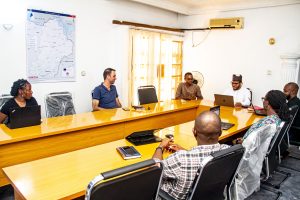Strengthening Humanitarian Partnerships: LPF Meets with DRC Country Director
In a significant move to deepen collaboration and strengthen strategic partnerships, Lindii Peace Foundation (LPF) recently held a high-level strategic familiarization meeting with the Country Director of the Danish Refugee Council (DRC). This engagement comes on the heels of the successful implementation of the Nigeria Humanitarian Fund (NHF)-funded project in Bama Local Government Area, Borno State.
The meeting served as a platform for both organizations to reflect on shared achievements, particularly in the area of Water, Sanitation, and Hygiene (WASH), and to map out synergies for future collaboration. LPF and DRC discussed key outcomes of the NHF project, which targeted critical humanitarian needs in conflict-affected communities, especially those grappling with displacement, inadequate sanitation, and limited access to clean water.
During the discussions, both parties reiterated their commitment to community-centered interventions that are sustainable, inclusive, and in alignment with global humanitarian standards. The Country Director of DRC commended LPF for its grassroots reach, timely implementation, and accountability to the communities it serves. In turn, LPF acknowledged DRC’s technical support, funding facilitation, and role in fostering local capacities.
The meeting also highlighted the importance of coordinated planning in humanitarian response. Both LPF and DRC explored opportunities for joint programming, field-based coordination, and capacity-building initiatives that can help scale up responses in underserved communities.
By reinforcing their partnership through this familiarization meeting, LPF and DRC are laying the groundwork for stronger collaboration in future humanitarian programming—one that is responsive to the needs of affected populations and aligned with national and international development priorities.
As humanitarian actors continue to operate in complex and fragile contexts like North-East Nigeria, such strategic engagements are essential for delivering life-saving interventions with impact, efficiency, and sustainability.







